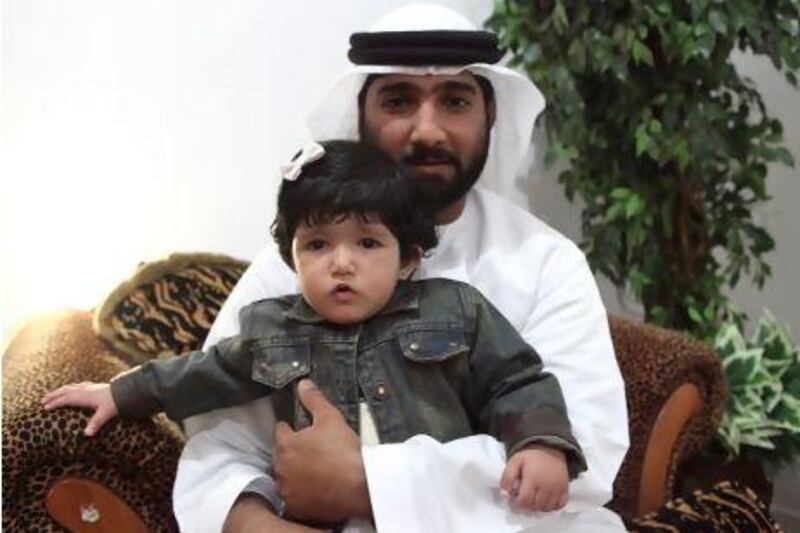ABU DHABI // Shaima Khalid Mohammed nearly died after doctors failed to diagnose a life-threatening condition when she was a baby.
She was born on April 15, 2011 - eight months before the Health Authority-Abu Dhabi set out new standards for screening for congenital heart disease in newborns.
"She would keep crying all night and wouldn't sleep," said Khalid Mohammed Abdullah Dalahi, Shaima's father. "We noticed she had difficulty breathing and taking in oxygen. Before we knew it, she started turning blue."
The concerned parents took Shaima to another hospital.
"The doctor told us everything was fine - that she was probably just suffering from indigestion and sent us home," Mr Dalahi, an Emirati, said.
But her condition persisted, and two days later she was taken to a third hospital, where doctors discovered Shaima's heart condition and referred the family to a hospital with paediatric cardiologists.
An echocardiogram showed Shaima suffered from double outlet right ventricle, a form of congenital heart disease in which there is a hole between the ventricles of the heart. Also, both blood vessels leave the right ventricle, which normally provides blood to the lungs. This malposition can result in cyanosis, or blue baby syndrome.
Doctors inserted a shunt, partially relieving the cyanosis, but they did not fix the hole in the baby's heart.
"Shaima was still sick and her movement wasn't normal," Mr Dalahi said. "She couldn't crawl properly and got tired quickly. She came out from the surgery worse than when she was admitted."
Tests showed she had DiGeorge Syndrome, a chromosomal disorder often characterised by congenital heart disease. It can cause unusual facial characteristics and affect a child's growth and development.
"What's strange is the [birthing hospital] noticed that Shaima's mouth was smaller than usual," her mother said. "But they just put 'abnormally small mouth' in her file and made nothing of it."
Doctors said Shaima needed a follow-up procedure, but she fell ill every time they scheduled the surgery. After three such incidents, Mr Dalahi took it as a sign. "I requested that my daughter be referred for treatment abroad," he said.
Shaima, then 18 months, was referred to the US Children's National Medical Centre, where she underwent surgery to patch the hole in her heart. Tissue blocking the artery to the lungs was also cleared.
The survival rate for newborns who undergo heart surgery is 95 per cent. This has led to a growing demand for adult care providers, said Dr Gerard Martin, co-director of the US Children's National Heart Institute. "We need to have patients like Shaima understand the importance of lifelong care," he added.
Dr Martin said the shunt procedure Shaima received in Abu Dhabi was life-saving and allowed her to grow and develop safely until she received corrective surgery.
"Survival depends upon surgical correction, usually in the first year of life," he said.
Shaima's parents said they were impressed by the way doctors at Children's National cared for her.
Mr Dalahi added: "We've been blessed with so many things here," he said. "The Government has made everything available to us, including covering the expenses for medical treatment abroad. We have the most sophisticated facilities but we are lacking qualified doctors.
"Until this improves I advise any Emirati with a child who requires surgical treatment to request a referral to travel abroad. I also urge doctors who don't have the capacity to operate on children to refrain from doing so, and not to be afraid to refer families overseas. We're talking about children's lives."





